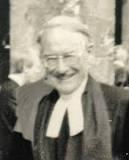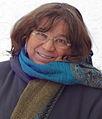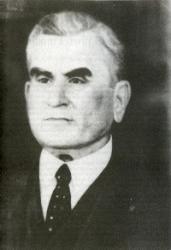Planning worship?
Check out our sister site, ZeteoSearch.org,
for 20+ additional resources related to your search.
- |
User Links
Person Results
George Bradford Caird

1917 - 1984 Meter: 8.8.8.7 Translator of "Shepherds Came, Their Praises Bringing" in Rejoice in the Lord George Bradford Caird (17 July 1917 – 21 April 1984), D.Phil., D.D., FBA, was a British churchman, theologian, humanitarian, and biblical scholar. At the time of his death he was Dean Ireland's Professor of the Exegesis of Holy Scripture at the University of Oxford.
Born in London, England to parents from Dundee, Scotland, George Caird's early years were spent in Birmingham, England, where his father was a construction engineer, and where he attended King Edward's School. His university education began at Peterhouse, Cambridge, where he received the B.A. in 1939, First-Class Honours in both parts of the Classical Tripos, with distinction in Greek and Latin verse. A lifelong Congregationalist, he then left Cambridge to study theology at Mansfield College, Oxford, and acquired the Oxford M.A., First-Class Honours, in 1943. In 1944 he was granted the Oxford D.Phil. for his thesis "The New Testament Conception of Doxa (Glory)".
After serving three years as a pastor in Highgate, London, in 1946 Caird and his young bride, Viola Mary Newport, known to all as "Mollie," pulled up stakes and left for Canada. Virtually fluent in ancient Hebrew, there he was quickly made Professor of Old Testament at St. Stephen's College, Edmonton, Alberta, and later (simultaneously) Professor of New Testament at McGill University and Principal of the United Theological College of Montreal.
In 1959 Caird returned to Oxford and the Congregationalist stronghold of Mansfield College, where he was first Senior Tutor (under John Marsh) and later Principal (1970–1977). Because he was non-Church of England, and because Mansfield was still a Permanent Private Hall and had not yet achieved status as a constituent College of the University (see Colleges of the University of Oxford) during this period (1969–1977), Caird was barred from holding an official university lectureship. However, as a compensation he was granted the honorary position of Reader (academic rank) in Biblical Studies, a status somewhere between Senior Lecturer and Professor. And whenever he lectured on the New Testament at Mansfield, students from all over the university came and filled the large lecture hall to capacity. According to Henry Chadwick, "He lectured as he preached, almost always without a note . . . with nothing before him but a Greek New Testament, usually upside down, for he knew the text by heart". In 1975-1976 Caird took on almost full-time administration, serving as Moderator of the United Reformed Church, and during his tenure he visited South Africa. His work in the fields of Old and New Testament (he remains one of the few modern biblical interpreters to have held chairs in both) led to four honorary doctorates (including the Oxford D.D.), election to the British Academy (and the granting of its Burkitt Medal for Biblical Studies), and appointment to be the Dean Ireland's Professor and Professorial Fellow at The Queen's College, Oxford.
In 1980 he won the Collins Religious Book Award for his work The Language and Imagery of the Bible. His final years involved biblical translation as a member of the translation panel of The Revised English Bible, as previously he had been a translator of The New English Bible's Apocrypha. He also co-edited (with Henry Chadwick ) Oxford's The Journal of Theological Studies from 1977-1984. In his lifetime he wrote nearly sixty articles, over a hundred book reviews, and six books. Following his resignation as Principal of Mansfield and his taking up of the Dean Ireland's chair, the Cairds left Oxford and moved into the sixteenth century thatched-roof "Brook Cottage" at Letcombe Regis, next to Wantage, Oxfordshire, seventeen miles southwest of Oxford. There they converted the cottage's back storeroom into "the Dusty" - a study for Caird to write in during his imminent retirement; it was there that he was working on his seventh major work, New Testament Theology, when he was felled by a heart attack on Easter Eve, 1984. His funeral was held in Mansfield College Chapel on 28 April, with Principal Donald Sykes delivering the eulogy; a memorial celebration was later conducted (13 October) in Great St. Mary's Church, Oxford, with his close friend Henry Chadwick delivering the address. A Festschrift was at the time in the works, which was subsequently converted into a memorial volume, The Glory of Christ in the New Testament: Studies in Christology in Memory of George Bradford Caird, edited by two of his students, Lincoln Hurst (L. D. Hurst) and Tom Wright (N. T. Wright), and published by Oxford University Press in late 1987. Shortly after his death, some quick decisions needed to be made, particularly that involving his half-completed New Testament Theology; accordingly, Hurst was appointed Caird's Literary Executor. In addition, his children (see below) set up a foundation, The G. B. Caird Memorial Trust, the proceeds from which might enable (successfully, as it turned out) a new senior position to be set up in his name at Mansfield College: the G. B. Caird Fellow in New Testament Theology. It is currently occupied by Dr. John Muddiman. Caird's academic legacy is also seen in that during the course of his career he taught numerous people who went on to garner serious scholarly attention. These include Marcus Borg, Colin Gunton, Lincoln Hurst, David P. Moessner, John Muddiman, Allison Trites, Francis Watson, and N. T. Wright. According to British Old Testament scholar James Barr, Caird was sometimes "practically adored" by students.
While to some Caird could appear austere, even intimidating, "he was in fact full of fun and humour". In his leisure time he enjoyed (most famously) bird-watching, croquet, snooker, music, theatre, reading mysteries, ping pong, chess, and all forms of puzzles — especially the crossword and jigsaw variety. Music in particular occupied his time: it "was important to him, and he wrote several hymns, some of which were included within standard hymnals such as Congregational Praise and Hymns Ancient and Modern". He and Mollie had four children: James, Margaret (Meg) Laing, John, and George (Geordie). To Caird the home was never just a house: it was a bastion of the family - a center of games, poetry, music, and other cultural activity, where he was, according to Henry Chadwick, "sublimely happy . . . it was a microcosm of vigorous debate and breathtaking wit, sparkling with his wife and his three sons and his daughter, whose gifts were a source of deep joy for him. From Mollie he caught his love for bird-watching, and from his children he loved to learn about architecture [James], drama [John], music [Geordie], and medieval philology [Meg]". Also, "no picture of George would be right which omitted his intense affection for his grandchildren."
--en.wikipedia.org/wiki/ (excerpts)
George Bradford Caird
John Maude Crament
1845 - 1912 Meter: 8.8.8.7 Composer of "IN EXCELSIS GLORIA (Crament)"
John Maude Crament
Edwin Mora Guevara
Person Name: Edwin Mora Meter: 8.8.8.7 Composer of "TALLER" in El Himnario
Edwin Mora Guevara
John O'Connor
1870 - 1952 Meter: 8.8.8.7 Translator of "Shepherds, Tell Your Beauteous Story" in The Cyber Hymnal O'Connor, John, was b. Dec. 5, 1870, at Clonmel, Ireland. After completing his theological studies in the English College at Rome, he was ordained priest 1895, in St. John Lateran, Rome; and is now (1906) priest in charge at Heckmondwike, Yorks. He contributed to the Arundel Hymns, 1902, a number of translations (see Index of Authors, &c), and the following original hymns:—
1. Ah, Lady of high heaven! B. V. M.
2. All the skies to-night sing o'er us. Christmas.
3. Father of all those far-scattered sheep of Christ. St. Patrick.
4. Hail! O new Jerusalem. Heaven.
5. Jesu! none is like to Thee. The Love of Jesus.
6. Jesu! the dying day hath left us lonely. Evening.
7. Joseph gentle, husband mine. Christmas.
8. Let sweet aud holy sound. Christmas.
9. Our Life hangs dead upon Calvary's hill. Good Friday.
10. The Angelus sweetly rings Ave Maria. The Angelus.
11. The buried flowers keep heart of grace. School Holiday.
12. The hour of grace sublime. Holy Communion.
[Rev. James Mearns, M.A.]
--John Julian, Dictionary of Hymnology, New Supplement (1907)
John O'Connor
Simei Monteiro

b. 1943 Meter: 8.8.8.7 Author of "Esa palabra en la vida" in El Himnario Simei Monteiro is a Brazilian poet, composer, translator, author and editor. She was Born in Belém, PA, Brazil in 1943. Her songs and translations appear in several hymn books and collections of sacred songs in Brazil, Latin America, USA, Europe, and Asia.
She has a degree in Portuguese, French Language and Literature, and a Degree in Artistic Education. She is interested in worship and the arts, and her book: The Song of Life, explores the relationship between Hymnody and Theology.
Until 2010, she was a missionary of The United Methodist Church, serving with the World Council of Churches (WCC), in Geneva, Switzerland, in the position of Worship Consultant.
Simei is married to a Methodist pastor and has two adult daughters, two granddaughters, and a grandson.
Simei Monteiro
Simei Monteiro
Greg Leavers
Person Name: Leavers Meter: 8.8.8.7 Alterer of "I am not sklled" in Complete Mission Praise
Greg Leavers
William Edwin Entzminger

1859 - 1930 Person Name: William Edwin Entzminger, 1859-1930 Meter: 8.8.8.7 Translator of "Em Cristo Há Perfeito Perdão" in Hinário para o Culto Cristão William Edwin Entzminger was born in South Carolina in 1859. He earned a B.S. from Furman University in South Carolina and then went to Southern Baptist Theological Seminary in Louisville, KY for a Doctor of Theology degree. He married Maggie Grace Griffith, and together they became Baptist missionaries in Brazil in 1891. He wrote and translated many hymns.
=================
Born: December 25, 1859, South Carolina.
Died: January 11, 1930, Petrópolis, Rio de Janeiro, Brazil.
Buried: Petrópolis, Rio de Janeiro, Brazil.
Entzminger studied at Furman University and the Southern Baptist Theological Seminary, Louisville, Kentucky. In 1891, he and his wife went to Salvador, Bahia, Brazil, where he worked as a missionary the rest of his life. He translated over 73 hymns into Portuguese, and wrote original Portuguese lyrics, as well.
--www.hymntime.com/tch
William Edwin Entzminger
A. E. Floyd
1877 - 1974 Person Name: A. E. Floyd, 1877- Meter: 8.8.8.7 Composer of "KESTON" in The Methodist Hymn-Book with Tunes
A. E. Floyd
Asa Abel
1796 - 1879 Meter: 8.8.8.7 Author of "I Love The Holy Son Of God" in The Cyber Hymnal Abel, Asa. (Cheshire County, New Hampshire, November 19, 1796--November 9, 1879, New York State). Free Methodist. Pastor in the Methodist Episcopal Church for eighteen years, serving as a presiding elder and being elected as a delegate to the General Conference four times. In 1861 he transferred to the Free Methodist Church, serving as district chairman of several districts in the Genesee Conference and as a delegate to the Free Methodist General Conference three times. He retired in 1873. His hymn "I love the holy Son of God" was published in the Free Methodist Hymnal, 1915.
--Anastasia Van Burkalow, DNAH Archives
Asa Abel
Martin L. Seltz
1909 - 1967 Person Name: Martin L. Seltz, 1909-67 Meter: 8.8.8.7 Alterer of "The Quempas Celebration" in Worship Supplement
Martin L. Seltz


 My Starred Hymns
My Starred Hymns


